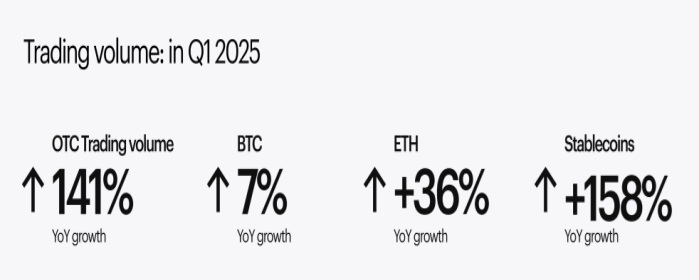TL;DR
- OTC and stablecoin trading volumes doubled year-over-year in Q1 2025, according to data from Finery Markets.
- Bitcoin, Ethereum, and stablecoins accounted for 95.3% of institutional transactions, reflecting low adoption of altcoins.
- Circle increased USDC volume 32-fold after obtaining the first MiCA license in Europe, while Tether lost presence in the region.
Trading volumes for cryptocurrencies in over-the-counter (OTC) markets and stablecoins grew significantly during the first quarter of 2025, driven by institutional interest and new regulations.
According to a report by Finery Markets, the value traded through institutional platforms doubled compared to the same period last year. The analysis covered two million trades conducted between January and March and revealed a clear preference for transactions involving Bitcoin, Ethereum, and stablecoins, which accounted for 95.3% of the total volume.

During the first hundred days of Donald Trump’s presidency, crypto-to-stablecoin transactions multiplied fivefold compared to Q1 2024. Crypto-to-crypto swaps also increased, with a 189% year-over-year rise, while crypto-to-fiat trades went up 35%. These figures show a clear trend among institutions that prefer more efficient ways to move capital without exposing themselves to volatility or stricter regulatory hurdles.
The Battle for the Stablecoin Market
In this context, Circle became one of the main beneficiaries of the regulatory shift in Europe. Its stablecoin USDC saw a 32-fold year-over-year increase in volume, boosted by the implementation of the MiCA regulation, which established a new framework for digital asset issuers in the European Union. Circle obtained the first license under this framework, which strengthened its position in the market and allowed it to move forward with its initial public offering planned for late April in the United States.

Meanwhile, Tether reached a new record in USDT’s market capitalization, hitting $144 billion. However, its presence in Europe decreased significantly after exchanges like Binance, Coinbase, and Kraken delisted several tokens, including USDT, to comply with MiCA requirements. Despite its global dominance, the European restrictions led to a reshuffling of market preferences, with a clear shift toward issuers that adapted more quickly to the new regulatory framework.

